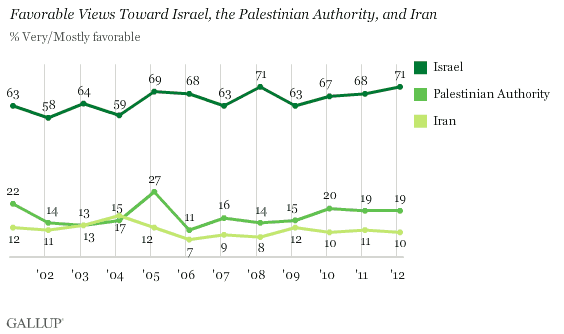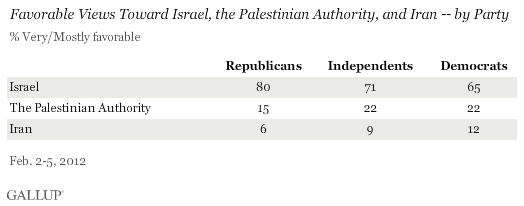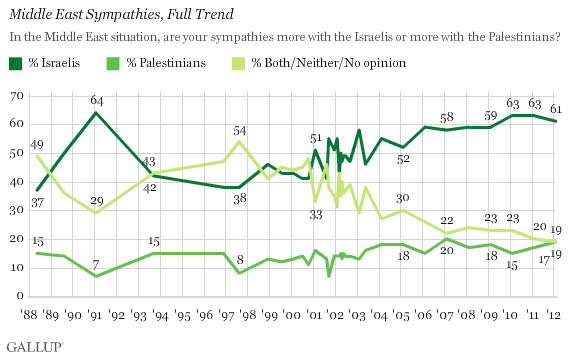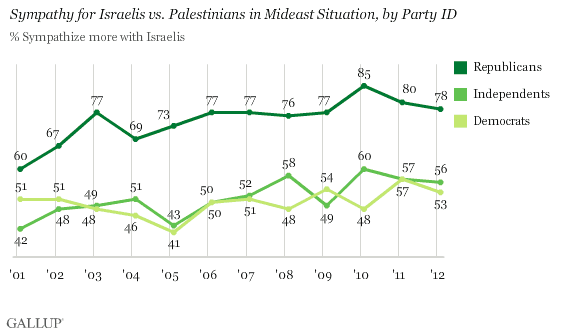WASHINGTON, D.C. -- The large majority of Americans continue to view Israel favorably, while far fewer say they view the Palestinian Authority or Iran very or mostly favorably.

These data are from Gallup's annual World Affairs survey, conducted each February since 2001. The Feb. 2-5, 2012, survey asked Americans to rate a list of more than 20 countries. Iran ranked at the very bottom, the Palestinian Authority was several spots higher up, and Israel was much closer to the top of the list.
President Obama is to meet with Israeli Prime Minister Benjamin Netanyahu Monday at the White House, where the two leaders will likely focus most of their discussion on their nations' respective stances toward Iran. Obama made strong statements on the issue in an interview this week with The Atlantic magazine, telling the publication that the United States "has Israel's back." Both leaders are scheduled to address the upcoming American Israel Public Affairs Committee conference in Washington D.C., which will also be highly focused on Iran. The three leading Republican presidential candidates are also set to speak at the pro-Israel lobbying organization's annual gathering -- each seeking to position himself as best equipped to support Israel.
The majority of Republicans, independents, and Democrats view Israel favorably, though Republicans give Israel its most positive ratings. All three groups are much less likely to view the Palestinian Authority or Iran favorably.

Still, even while the Israel-Iran situation has been brought to the fore, the unresolved issues between the Israelis and the Palestinians remain prominent in U.S.-Israel relations.
On that front, most Americans also continue to say their sympathies are more with the Israelis than with the Palestinians.

Americans have consistently been more sympathetic to the Israelis than the Palestinians since Gallup started asking the question in 1988. Since the mid-2000s, Americans have become increasingly sympathetic to the Israelis, while the percentage sympathetic to the Palestinians has stayed the same. The percentage volunteering a neutral position or no opinion has declined in recent years. Republicans continue to be far more likely than independents or Democrats to sympathize with the Israelis.

Bottom Line
The United States has long been an ally of Israel, and Americans continue to show decidedly positive views toward that nation. As nations throughout the Middle East undergo tumultuous change, perhaps making the region more politically unstable, Americans still appear to see Israel as important, with large majorities viewing it favorably and many more giving their sympathies to the Israelis than to the Palestinians.
Americans' partiality toward Israel over Iran is also clear and is apparent across party lines. While this doesn't necessarily mean Americans would support Israeli military action against Iran over that country's nuclear weapons development, it does suggest Americans would be sympathetic to Israel's concerns, and react positively to Obama's recently supportive statements toward Israel in the matter.
Survey Methods
Results for this Gallup poll are based on telephone interviews conducted Feb. 2-5, 2012, with a random sample of 1,029 adults, aged 18 and older, living in all 50 U.S. states and the District of Columbia.
For results based on the total sample of national adults, one can say with 95% confidence that the maximum margin of sampling error is ±4 percentage points.
Interviews are conducted with respondents on landline telephones and cellular phones, with interviews conducted in Spanish for respondents who are primarily Spanish-speaking. Each sample includes a minimum quota of 400 cell phone respondents and 600 landline respondents per 1,000 national adults, with additional minimum quotas among landline respondents by region. Landline telephone numbers are chosen at random among listed telephone numbers. Cell phone numbers are selected using random-digit-dial methods. Landline respondents are chosen at random within each household on the basis of which member had the most recent birthday.
Samples are weighted by gender, age, race, Hispanic ethnicity, education, region, adults in the household, and phone status (cell phone only/landline only/both, cell phone mostly, and having an unlisted landline number). Demographic weighting targets are based on the March 2011 Current Population Survey figures for the aged 18 and older non-institutionalized population living in U.S. telephone households. All reported margins of sampling error include the computed design effects for weighting and sample design.
In addition to sampling error, question wording and practical difficulties in conducting surveys can introduce error or bias into the findings of public opinion polls.
View methodology, full question results, and trend data.
For more details on Gallup's polling methodology, visit www.gallup.com.
